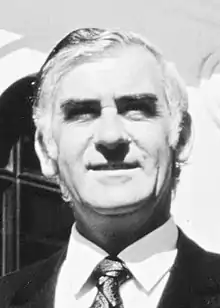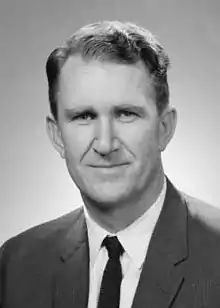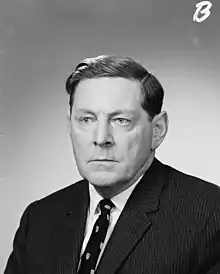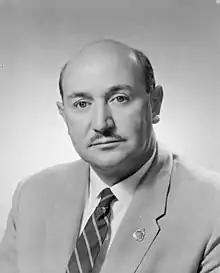1971 Liberal Party of Australia leadership spill
The Liberal Party of Australia held a leadership spill on 10 March 1971. Prime Minister John Gorton called for a vote of confidence in his leadership, which was tied, prompting Gorton to resign. William McMahon subsequently defeated Billy Snedden for the leadership, and was sworn in as prime minister on the same day. Gorton was elected as his deputy, defeating Malcolm Fraser and David Fairbairn.
| ||||||||||||||||
| ||||||||||||||||
| ||||||||||||||||
| |||||||||||||
| |||||||||||||
| |||||||||||||
Background
On 8 March 1971, Defence Minister Malcolm Fraser resigned from cabinet, supposedly over Gorton's failure to support him in a dispute with Chief of the General Staff Thomas Daly. The following day, Fraser gave a statement to the House of Representatives in which he excoriated Gorton and called him "not fit to hold the great office of prime minister". Fraser's actions brought to a head tensions over Gorton's leadership style, particularly what his opponents viewed as his lack of consultation with cabinet. In response, Gorton called a partyroom meeting for 10 a.m. on 10 March.[1][2]
Meeting
The partyroom meeting began with an open debate on the leadership. Gorton, who was chairing the meeting, then called for a vote of confidence in his leadership, which was tied at 33 votes in favour and 33 votes opposed. Gorton supporter Duke Bonnett was the only absentee (due to illness); had he been present, Gorton would have received 34 votes. Under party rules of the time, Gorton could have retained the leadership. However, Gorton resigned, saying a tie vote was not a vote of confidence. He turned to Foreign Affairs Minister William McMahon and nominated him for the leadership, to the applause of his colleagues; Billy Snedden, the Minister for Labour and National Service, was the only other nominee. McMahon – who had been deputy leader of the Liberal Party since 1966 – defeated Snedden with what The Canberra Times called "a comparatively small majority".[3] The exact result was kept secret, as was the party's practice at the time, but has been estimated to have been 40 votes for McMahon to 26 for Snedden.[4]
After McMahon was elected as leader, there was a second ballot to elect his successor as deputy leader. Somewhat unexpectedly, Gorton put himself forward as a candidate and was elected, defeating Malcolm Fraser and backbencher David Fairbairn. McMahon was sworn in as prime minister by Governor-General Paul Hasluck later that afternoon; his full ministry was not sworn in until 22 March.[3]
Candidates
- William McMahon, incumbent Deputy Leader, Minister for Foreign Affairs, Member for Lowe
- Billy Snedden, Minister for Labour and National Service, Member for Bruce
Results
| |||||||||||||||||
| |||||||||||||||||
The following table gives the ballot result:[5]
Leadership ballot
| Name | Votes | Percentage | |
|---|---|---|---|
| William McMahon | 40 (est.) | ||
| Billy Snedden | 26 (est.) | ||
Deputy leadership ballot
| Name | Final ballot | Percentage | |
|---|---|---|---|
| John Gorton | >33 | ||
| Malcolm Fraser | <33 | ||
| David Fairbairn | <33 | ||
Aftermath
Gorton was sacked from cabinet for disloyalty in August 1971, and subsequently resigned the deputy leadership and was replaced by Snedden.[6] McMahon lost the December 1972 federal election to the Labor Party, led by Gough Whitlam.[7]
| |||||||||||||
| |||||||||||||
| |||||||||||||
See also
References
- P.M. Faces Vote of Confidence, The Canberra Times, 10 March 1971.
- Hughes's wintry blast for the undertaker PM, The Sydney Morning Herald, 1 June 2002.
- McMahon Becomes P.M., The Canberra Times, 11 March 2017.
- Colin Hughes (1976), Mr Prime Minister: Australian Prime Ministers, 1901–1972, Oxford University Press, p. 194.
- "I don't feel the slightest bit excited or emotional... I have seen Prime Ministers come and go' 'I am a very great believer in the system of Cabinet government, of full discussion in Cabinet' Mr McMAHON BECOMES P.M Mr Gorton goes to Defence". Canberra Times. 11 March 1971.
- "Liberal Party Post". Canberra Times. 19 August 1971.
- Australia's PMs > William McMahon > In office Archived 15 March 2011 at the Wayback Machine, National Archives of Australia. Retrieved 5 November 2017.
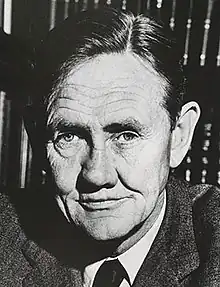
.jpg.webp)
